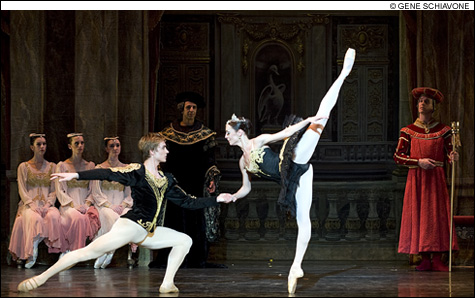
NASCENT SWAN: Vilia Putrius was emotionally and technically nervous but didn’t let the side down. |
Swan Lake is ballet’s prima ballerina because, 131 years after its Moscow premiere, it’s still poised on pointe. You have a woman who’s the object of two men (though Rothbart as Odette’s lover always get short shrift) and a man who pledges his troth to two women (played by the same ballerina). You wonder what Siegfried is thinking when, as he’s about to be auctioned off to his mother’s choice of princess bride, Rothbart runs on with Odile — does he think she’s Odette in a sexy black negligee? It’s a ballet that anticipates Tchaikovsky’s own life: the year after Siegfried first said no to conventional marriage, the homosexual composer made the mistake of saying yes to Antonina Milyukova. It’s a ballet with two endings: there’s the traditional one, where Siegfried and Odette throw themselves into the lake (since he can no longer break her spell) and free the other swans from Rothbart’s magic, and the Soviet happy one, where Siegfried, never mind his philandering, beats up Rothbart in a fair fight, frees everyone, and lives happily ever after with Odette in the palace rather than in some misty swan heaven. From the first note you’re not sure where you are: the oboe’s F-sharp could belong to B minor or B major. When it’s over, you’re not sure where you’ve been, whether it’s all Siegfried’s dream or yours.
Swan Lake is also the ballet to end your season with, and this season that’s what both Festival Ballet Providence and Boston Ballet are doing. (Boston Ballet is appending a “Three Masterpieces” coda, but the Swan Lake feels like the big finish.) FBP gave three performances April 25-27, with choreography by artistic director Mihailo Djuric and ballet mistress Milica Bijelic (after Ivanov and Petipa, of course), a set (from Pittsburgh Ballet Theatre) that looked very much like the one Boston Ballet used to have, and an Odette/Odile (in the performance I saw Sunday), Vilia Putrius, who used to be a member of the Boston Ballet corps. You might wonder how Putrius could go from not being offered a new contract in Boston to dancing ballet’s prima ballerina role in Providence, and what that says about the two companies. (Providence makes do with Boston corps leftovers? Boston overlooks rising star?) Putrius gave a creditable performance that was emotionally nervous and technically unstable; she didn’t let the side down, but it wouldn’t pass muster in Boston.
Of greater interest were the innovations in the story line. In most productions, the curtain remains down during the overture, rising to reveal Siegfried and his friends celebrating his birthday outside in the garden or park. Here it rose on Putrius as a young girl clad in a white shift and wandering through the forest. Rothbart swoops, and after a brief struggle the girl vanishes through the back curtain and re-emerges as a swan. At the end, after Odette has run off, Siegfried wrestle with Rothbart, breaks a wing, and breaks the spell, whereupon Odette runs back on in her shift, a girl again, and embraces him. It’s an engaging tableau and one that makes the story clearer to the audience; the drawback is that if Siegfried’s going to defeat Rothbart, he needs to do so with love, not muscle. Which means Odette has to be with him on stage, defying Rothbart and proclaiming that love that’s not perfect is still love. Here she has to be off stage changing out of her tutu.